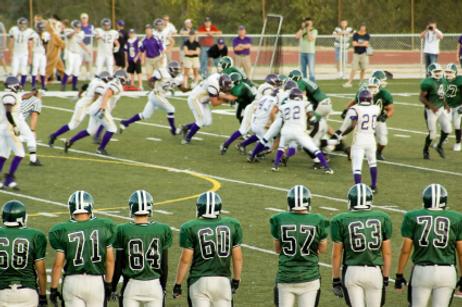The homeschooling ranks are growing in the United States, with the number of children homeschooled growing from 850,000 in 1999 to more than 1.5 million in 2007, according to the National Center for Educational Statistics.
Students who are homeschooled are usually taught the same subjects as their peers who attend public schools. Homeschooled students struggle with algebra, write up book reports, and learn to conjugate Spanish verbs – just like their public-schooled friends.
However, one aspect of the public school experience that homeschooled students cannot enjoy is participating in team sports. In recent months, parents of homeschooled children in several states began pushing to change school district rules, advocating for their children to be a part of their local public schools' sports teams. The movement has sparked debate on both sides of the issue, proving that not all parents or school districts are “team” players.
This video explains how to put your homeschooler in the public school's sports program.
Why Some School Boards Are Reluctant to Allow Homeschoolers on Their Teams
Homeschooled students can't meet academic eligibility requirements
In Illinois, the school district 301 board recently heard arguments for and against establishing a rule that would allow homeschoolers to join public school teams. According to the Courier News, one board member objected to the proposal, arguing that it would not be fair to public school students who must meet certain grade point average requirements to play sports.
In Virginia, homeschooling parents have launched a campaign to gain access to public school sports teams. In response, the executive director of the Virginia High School League told a local news station that allowing homeschooled students to play sports would shortchange the public school students who work hard to keep their grades up. "By playing by a different set of rules," he said, "it's inequitable and unfair to public school students."
Homeschooled students might crowd out public school students
Some school board members worry that homeschooled athletes might take spots on teams that should rightfully go to public school students. In the Courier News article on the debate, Mike Roberts, a school board member against letting homeschooled children into the teams, is quoted as saying, "I would hate to see kids at school sit on the bench or not make the team for this kid who is an outsider anyway."
Parents who home school their children have chosen to opt-out of the system
The Virginia High School League opposes a bill that would allow homeschooled students across the state to play on public school teams, according to local Virginia news station WVEC. Ken Tilley, executive director of the league, says that parents who home school their children have chosen to opt-out of the public education system, and thus, they have also elected to forgo certain privileges that accompany enrollment in the public school system.
Why Some Say the Homeschooled Should Be Allowed to Play
To keep out homeschooled students is discrimination
Stan Brockinton, the parent of a 14-year-old homeschooled Florida student who was not allowed to play soccer at his local public high school is suing the Florida High School Athletic Association. "It seems like discrimination," he told the Gainesville Sun.
Parents of homeschooled students are still taxpayers
Proponents argue that the parents of homeschooled students are still taxpayers, which means they have the right to benefit from public school services. In addition, as the Courier News reports, the same high school that currently prohibits homeschooled students from playing on its sports teams does regularly allow homeschooled students to participate in its band, chorus, and theatre programs.
Homeschooled students won't hurt the team
The proponents also assert that homeschooled students will not do any harm to public school sports teams, and in fact, they may even prove to be assets to the school teams. In the Virginia news station WVEC's report, Brandy Bergenstock, the parent of a homeschooled girl who would like to play on a public school soccer team, maintains that homeschooled students will not "overwhelm the school with our presence" and that "the few kids that would like to be on [the sports team] can enrich the team."
A school board member in Illinois echoes this sentiment, saying that "we're talking about a few kids and it is something we are very capable of doing."
This video reports on the homeschoolers being allowed to play sports in Kansas public schools.
The jury is still out on allowing homeschooled students to play on public school teams. For the moment, it remains a decision that most states allow their school boards to make on an individual basis.
Questions? Contact us on Facebook. @publicschoolreview











